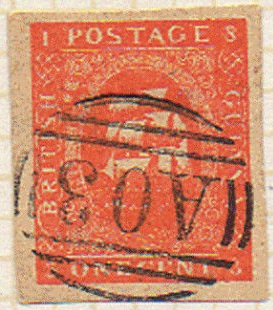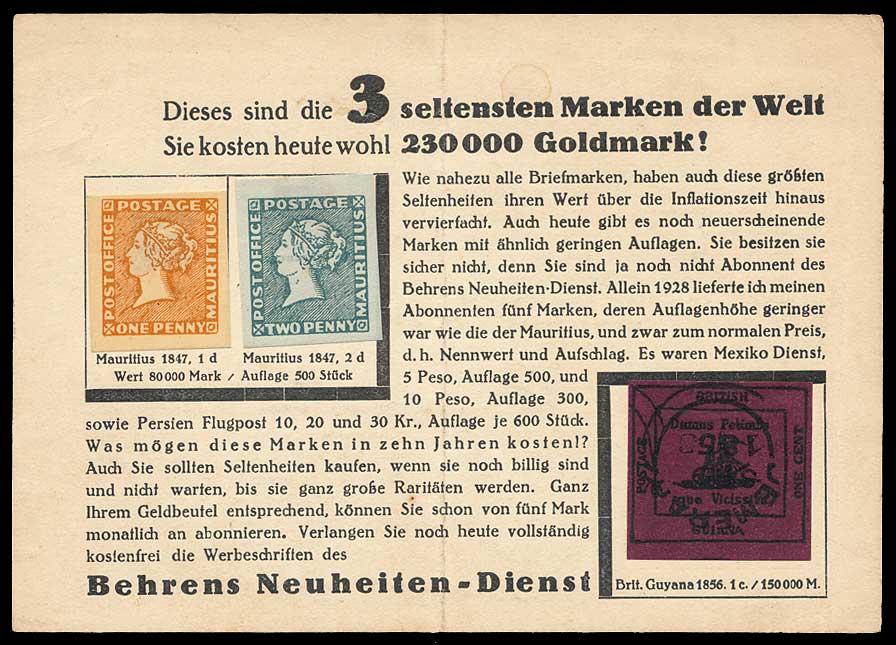 |
|||||
|
|||||
| Preview of Stamps Catalogue: VOLUME 1 |
 |
|||||
|
|||||
| Preview of Stamps Catalogue: VOLUME 1 |
Return To Catalogue - Issues of 1860 - Issues of 1876-1888 - Issues of 1889-1920 - Miscellaneous
Note: on my website many of the
pictures can not be seen! They are of course present in the catalogue;
contact me if you want to purchase it.
For stamps of British Guiana issued before 1853 click here.

(Reduced size)
One cent red Four cents blue
Some perforated reprints exist. They also exist with the perforation cut off, pretending to be genuine stamps. Specialists distinguish three types of these stamps, type 1 without whit line above the value-inscription, type 2 with such a line and type 3 (4 c only) with the numbers in the corners with white outline.

(4 c type 3, with outline around the numbers in the corners)
Value of the stamps |
|||
vc = very common c = common * = not so common ** = uncommon |
*** = very uncommon R = rare RR = very rare RRR = extremely rare |
||
| Value | Unused | Used | Remarks |
| 1 c | RRR | RRR | |
| 4 c | RRR | RRR | |
| Reprints | R | - | |


Two plate proofs in black color.
Forgeries exist, examples:



Two forgeries made by the same forger (possibly Oneglia?). Note the difference in
lettering and design when compared to a genuine stamp.

(This stamp was offered as genuine on a prestigious Internet
auction in 2004, however, it doesn't resemble the above genuine
stamps; forgery?)
A reprint was made somewhere in the 1950's together with the book "A Century of Stamp production" by Waterlow & Sons. It has "Reproduction only No Postal of Philatelic value" printed at the back.


Two different scans of the same stamp; the unique 1 c value.
1 c black on red 4 c black on red 4 c black on blue
Only one stamp exists of the 1 c value. This unique stamp was sold on an Siegel auction in 1980 for a record sum of $935.000 (source: http://www.siegelauctions.com/home.htm) to John E. du Pont (initially it was not known who exactly bought the stamp). The stamp was found in 1873 by a 12 year old schoolboy, Vernon Vaughn, in Demerara. It was sold to N.R. McKinnon (McKenner?), for $1.50. McKinnon sold it to Wylie Hill in Great Britain. Thomas Ridpath paid $600 for it and it then ended up in the collection of Count Phillipe von Ferrari in the 1880's for £150 (about $750). It was then confiscated by the French (to repay for the war damage by the Germans after world war I). This very famous stamp was then sold in a public auction in 1922 for 325000 French Francs, paid by Arthur Hind. It used to be part of the Hind collection untill he died. It was then owned by a certain Frederic T. Small. In 1970 it was sold at a Siegel auction for $280.000 to a consortium led by the stamp dealer Weinberg. Recently the forger(!) Peter Winter claimed to have found a second example of this stamp. But after a lot of commotion it was finally declared an altered example of a damaged 4 c stamp after examination by the Royal Philatelic Society of London.

(The second copy of this stamp turned out to be a forgery)
Value of the stamps |
|||
vc = very common c = common * = not so common ** = uncommon |
*** = very uncommon R = rare RR = very rare RRR = extremely rare |
||
| Value | Unused | Used | Remarks |
| 1 c | -- | RRR | |
| 4 c black on red | RRR | RRR | |
| 4 c black on blue | RRR | RRR | |
These stamps are supposed to be signed. The following signatures exists "E.T.E.D.", "E.D.W", "W.H.L." and "C.A.W.".



Most of these stamps bear a signature, here with "EDW".


Here some stamps with "CAW" (Watson) signature.
Forgeries, examples:

These forgeries are very similar to those that appear in the Moens catalogue ('Les Timbres-Poste
Illustres' by J.-B.Moens 1864, plate 54).
Fournier offers the above forgery in his 1914 pricelist as a second choice forgery (2 different stamps, differing in the colour I presume, for 1 Swiss Franc). There are many differences with the genuine stamps (for example the ship is entirely different). The word "Que" is written as "que". The first stamp has a "A5" numeral cancel(?). The others have a pattern of dots or "20" or "B02". This forgery type also exists uncancelled.
Other forgeries:

The genuine stamps (according to 'The forged stamps of all countries' by J.Dorn') should have the frame open in the corners. The "Q" of "Que" should not be a "q" as in the above forgeries!

Forgery with 'FACSIMILE' written at the bottom

The same forgery on a dealer advertisement sheet, it was possibly
made by H.E.Harris in the 1960's.

A whole block of stamps with "FACSIMILE" written at the
bottom. This is a different forgery from the one above.
Some recent (1980?) Peter Winter forgeries with the correct "Q":
Above another two forgeries on letter with the right "Q" (Peter Winter forgeries as well) adressed to 'The Lord Bishop of Guiana Georgetown' (the letter is also forged).

A Walter Behrens advertisement card with two Mauritius forgeries
and a British Guiana forgery made somewhere end 1920's begin
1930's.


Front and backside of an advertisement label of a German stamp
dealer Walter Behrens in Braunschweig (probably somewhere in the
early 1930's). The text on the back reads 'Nachbildung kostenfrei
uberreicht durch Briefmarkenhandlung Walter Behrens Braunschweig
Werbeschriften kostenfrei'. The cancel is placed slightly
different then on the above advertisement card.
A minisheet with the British Guiana 1 c 1856 stamp issued for the Nordposta '77 exhibition in Hamburg, printed by the printing firm of Gehringer in Germany:

For issues of 1860 click here.